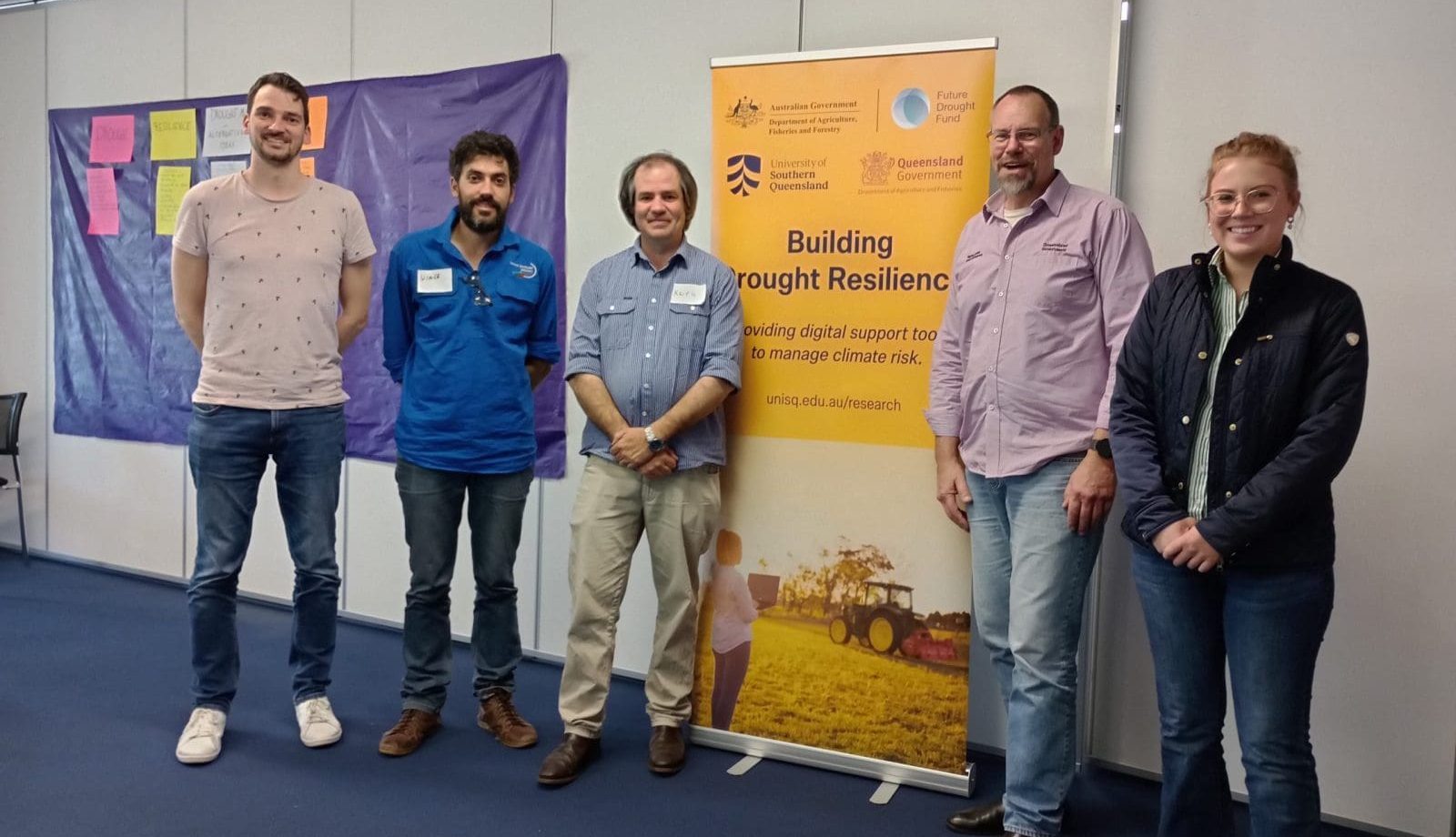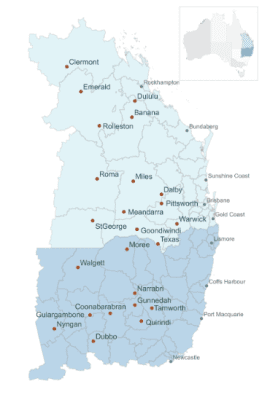
UniSQ researcher Dr Uwe Grewer, SQ Landscapes sustainable agriculture facilitator Vince Parisi, UniSQ’s Prof Keith Pembleton, QDAF’s Dr Andrew Zull and Mackenzie Leeson from SQ Landscapes at yesterday’s workshop at Dalby.
THE first of five workshops designed to help growers and consultants make better-informed cropping decisions kicked off at Dalby yesterday.
Entitled Increasing Drought Resilience of Broadacre Farming through Digital Support Tools the workshops were made possible by the Federal Government’s Future Drought Fund.
The workshops are designed and delivered by Queensland Department of Agriculture and Fisheries and University of Southern Queensland researchers.
“Our workshops enable farmers to come up with personalised cropping decisions that best suit them, through group activities and computer simulations,” QDAF senior economist Andrew Zull said.
“While winter-dominant cereal-cropping systems may have traditionally been used in many locations across southern Queensland, we have seen a strong increase in diversity over the recent decade,” Dr Zull said.
“Choosing the right system for your own circumstances is not driven in isolation by the prevailing rainfall pattern, but also influenced by labour availability, pest and disease issues, and the need to diversify risk across crops and commodities.”
Through the Agricultural Risk Management Online, or ARMonline, platform, workshop participants can access Crop Analysis for Risk Management, or CropARM, and the recently added RotationARM, which allows growers to compare different cropping strategies.

Study sites in Qld and NSW which form part of the Increasing Drought Resilience of Broadacre Farming through Digital Support Tools project.
Dr Zull said CropARM and RotationARM enable growers to test out their theories about what crops and sequences will be the most resilient in dry times before they plant a seed.
Wheat, chickpeas, canola, sorghum, mungbeans, soybeans, and canola are the choices growers can select to model in a standalone season, or as part of a rotation.
The tools also allow growers who anticipate a wet season and plan to implement a cropping strategy that relies on sufficient water supply to estimate losses they would incur in case an unexpected drought materialises.
The workshops encourage growers and agronomists to apply the ARM tools to their own operations so they can draw their own conclusions and rules of thumb for decision-making to achieve drought resilience.
While the current season in Qld and northern NSW has drought far from the collective mind, it remains a major and long-term challenge for growers, who make summer and winter cropping decisions around some of the most variable rainfall patterns found in any of Australia’s grain-growing areas.
“We continuously develop the online decision-support tools of the ARMonline platform,” UniSQ’s Uwe Grewer said.
“The platform makes the complex research tool APSIM available to farmers and agronomists for on-farm decision making,” Dr Grewer said.
The point-and-click user interface is easy to use for rapid analyses, and RotationARM allows users to specify their location, production costs, prices, crops grown, cropping intensity over years, production inputs, and sowing rules.
RotationARM then presents results for key system performance metrics such as overall gross margin, achieved cropping intensity, water-use efficiency, soil-carbon levels, and surface organic matter cover.
Further analysis can be undertaken to compare different systems and intensities under different drought-exposure scenarios and identify what would work best.
“It permits farmers to analyse the yields and gross margins of alternative crop and management choices and see how they perform under average rainfall conditions as well as under drought.”
The digital tools are built on APSIM data, which factors in 60 years of climate records, and UniSQ’s Keith Pembleton said they are an aid, not a replacement, for grower insight and agronomic advice, when it comes to choosing which crops to grow, and in what rotation.
“Choosing suitable cropping strategies reduces a farm’s vulnerability to drought,” Professor Pembleton said.
“Avoiding drought sensitivity while taking full advantage of high-rainfall seasons requires farmers to design well-balanced cropping strategies.
“This complex task can be assisted by a support system of agronomists and our extension-focussed decision-support tools.”
Intense and frequent drought events often result in a loss of soil organic matter, reduced soil fertility, and less soil water-holding capacity, and CropARM and RotationARM can be used to help growers make better environmental decisions, as well as more profitable ones.
Upcoming workshops run from 9am to 3pm and are free of charge, with dates and locations as follows:
- Coonamble: Monday, September 2;
- Narrabri: Tuesday, September 3;
- Tuckerang: Wednesday, September 11;
- Roma: Thursday, September 12.
Grain Central: Get our free news straight to your inbox – Click here

HAVE YOUR SAY